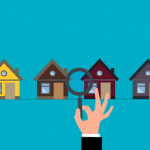
You’ve just bought a house but now have to move
Moving house is expensive and if you’ve only just bought a house and have to move already, this is costly and a lot of hassle. You may even not have emptied your boxes!
So have you just bought a house and want to move already? If you’ve only just bought a house and want to move already, you need to be aware that some buyers may not be able to get a mortgage on your house if you bought less than six months ago. But if you wait until six months has elapsed this problem goes away.
Before looking at the implications and what you need to consider if you have just bought a house and want to move already, is the reasons why you might already be looking to sell having only just purchased.
Reason why people end up selling a house shortly after buying
There are a number of reasons why house owners end up selling a house shortly after buying. These include the following:
- A failed move to the countryside.
- A failed move to a town or city.
- Downsizing.
- Job loss due to redundancy.
- Downturn in your business.
- Relocating for a new job opportunity.
- Health problems.
- Splitting up with a partner or divorce.
- An unexpected baby on the way.
1. A failed move to the countryside and you now need to move
You might have moved out to the countryside for the first time after living in a town for all your life. But it may be that you don’t like it. Living in the countryside is not for everyone.
It’s not uncommon to miss the convenience of town or city living. People don’t realise what it’s like to no longer be close to shops, restaurants and bars. Living in the countryside usually requires you having to drive everywhere.
To avoid the upheaval of moving again so quickly, it’s worth persevering with your new house for a while longer and to a different way of life. But if you have tried it and you really don’t like it, your alternatives include:
- Sell and buy again in a town or city. Or you could try a small village where you can at least walk to the local shop or pub.
- Become a landlord and rent your house to tenants. But you may want to read this article on what the real costs are of becoming an accidental landlord.
- Speak to us about other creative solutions.
2. A failed move to a town or city and you hate it
The opposite to the above scenario is if you’ve spent the majority of your life living in the countryside. If you’ve now moved to a town for the first time after living in countryside, it’s possible you may hate it.
You could try moving to a smaller town or village instead. But there’s no getting away from the fact that moving again soon after buying is a lot of hassle and will be costly (see below for the costs of selling and buying again).
Alternatively, you could try renting for a while in another place to see if you like it before committing to buying again. In fact it’s recommend for homeowners to sell their house and rent before buying again in any case. To find out what the advantages are of this approach, you may like to read this article on selling your house and renting before buying.
But you may also want to take a look at this article about the tax implications of buying a house before selling too.
3. You bought a house to downsize and now need to move
It’s possible that you’ve downsized from a larger house. But soon after you very quickly realise you don’t like living in a smaller house. Usually when you downsize you are able to bank some of your equity from the sale of your larger house.
If you are in the fortunate position to have enough equity to buy another house, it means you don’t necessarily have to sell the house you’ve only just bought. On the basis you’ve just downsized, your new house is likely to be a better investment property. This means you are better placed to become a landlord and rent it to tenants.
But you may want to read the above article about the true costs of becoming an accidental landlord above. Being a landlord can be a lot of work.
This means you don’t have to sell to buy another house. But you may want to also look at the above article on the tax implications of buying a house before selling too.
4. Job loss due to redundancy means you need to move shortly after buying
Being made redundant could have significantly affected your financial circumstances. If this has happened soon after buying your house, this may make it difficult to afford your mortgage payments. Unless of course you can get another job quickly.
To help with your mortgage payments you may be able to get government support or you could rent a room in your house instead of selling. But if you choose to sell your house instead, you may find it near impossible to get a mortgage on another house if you’re unemployed.
You will also find it very difficult to rent too if you’re unemployed. Letting agents will carry out a credit check and an affordability check too.
Therefore, if you are able to weather the storm until you can find another job, this is your better option.
5. Downturn in your business but now need to move
If you are a business owner, you’ll know that business doesn’t always go to plan. Most entrepreneurs know there are ups and downs in business. It would be unfortunate timing if your business faces a downturn at the same time as just having bought a new property.
As an entrepreneur you may be more open to the idea of becoming a landlord. But that’s not true of every business owner, as not everyone likes the idea of looking after tenants. But it’s worth considering to rent your house and move to something cheaper whilst you weather the storm.
You could also consider lettering a room to receive more money from your house too.
6. Relocating for a new job opportunity so you need to sell your house shortly after buying
If you’ve just been offered a new job opportunity, but it means you will need to relocate, you may need to sell your house. But if you’ve only just bought a house and want to move to relocate, you may be better to rent first before buying again. This is at least until you know you like your new location.
You may be better off renting the house you own to tenants so you don’t have to sell it. Then rent a house in your new location. The added benefit to this option is you get to know the new area first, before you commit to buying a new house.
7. Health problems means you need to move
Health problems can hit anyone at any time. I know this from personal experience, having survived cancer. The trouble with a serious illness is that your income can take a dip whilst you go through the illness. It would be unfortunate if this happened right after just buying a house.
The illness may put financial pressure on you, which may mean you have to sell and move again. However, you may want to consider the other options discussed so far, like renting a room out in your house for example.
8. Splitting up with a partner or divorce is forcing you to sell a house you recently purchased
It’s never a nice time when and if you go through a break up or a divorce. If you find this happens just after moving into a new house, that’s unfortunate.
One option to try is to agree that one of you take over the property and buy the other partner out. This is only possible if the income of the remaining owner is sufficient to cover the mortgage. But it won’t be about affording your current mortgage, as you will need to re-mortgage your house for a higher amount in order to raise the funds necessary to buy your partner out.
This also relies on the fact that you can be civil to each other too during the break up or divorce.
9. An unexpected baby on the way means you need to move to a large house
Accidents happen all the time and babies come along unexpectedly. If might be that the timing of your new pregnancy is just after buying a new home. But it may also be the case your new home isn’t big enough for a new addition to the family. This is especially true if it’s something you hadn’t planned!
You may want to consider the option of an extension to your house. This might be a better option, certainly before you embark on any of the other options mentioned so far in this article. If you have scope to extend your house to add another bedroom, you will solve the problem and no longer need to move. But also, you’ll add value to your house too.
10. Bad or noisy neighbours is causing you to need to move shortly after buying
If you discover you have terrible or noisy neighbours, the first thing you need to enquire about is whether this was declared by the people who sold the house to you.
But if the sellers didn’t, this may be difficult to prove. But it’s also possible they were not bothered by whatever it is about your neighbours you get annoy about.
If it’s a noisy neighbour issue, you could sound proof the walls. Sound-proofing the walls will be a cheaper option to selling up and moving soon after buying.
Can you resell a house you just bought?
You can resell a house you just bought at any time you like, which is what investors do all the time. However, unless you’ve upgraded the property in someway by refurbishment or an extension in the short time of ownership, you are unlikely to recoup the buying and selling costs unless you’re very lucky with the market.
Is selling a house shortly after buying easy or difficult?
Selling a house you’ve owned for only a short period of time could prove to be more difficult to sell than one you’ve lived in for years.
The reason for this is that buyers will ask more questions. They might be more suspicious and they may worry there’s something wrong with the house or with the neighbours.
However, you may have a genuine reason for just having bought a house and wanting to move already. If so, this can be explained. For example, if you are relocating for a job opportunity. In this case there’s nothing wrong with the house, you are simply moving for genuine reasons.
But be prepared to answer questions on this, as it’s very easy to discover the last sale date of your house.
Will buyers be able to get a mortgage on your house you’ve only just bought?
Your buyers may not be able to get a mortgage on your house with certain lenders if you’ve only owned it for a short time. Many mortgage lenders restrict their lending criteria, which will prevent buyers from borrowing on properties that have been owned for less than six months.
This will therefore limit which mortgages your buyers are able to apply for. Therefore if circumstances allow, you are far better to wait at least five months before you sell again. The reason I say five months rather than six is that by the time your buyers complete their mortgage application, you will have owned the property for more than six months.
This problem does not exist if you’re happy to sell your house to investors instead. If you are in this position and you need to sell, you may like to read this article on needing to sell your house fast.
Sellers will know you’ve only just bought your house
Be prepared for questions about selling your house soon after buying, as everything is on the internet.
With websites like Zoopla and the like, buyers will know the date when you bought your house. This will raise questions for sure.
You must be honest with your buyers at this stage, plus when you complete your Property Information Questionnaire (PIQ) during the conveyancing process. For example, if you have a dispute with your neighbours you need to disclose this. You are legally obliged to disclose this type of problem, even if it means it will make it more difficult to sell your house.
The selling agent will also be suspicious too and will ask the question about why you are selling so quickly after buying.
First time buyer benefits will no longer apply
If the house you have just bought was a first time purchase as a first time buyer, you will no longer be classed as a first time buyer.
This could mean you no longer qualify for the benefits of what many first time buyers get.
Will your mortgage lender let you sell your house if you’ve only just bought it?
Your mortgager lender cannot prevent you from selling your house at any time you wish. But if you have a fixed rate mortgage you may have to pay a penalty if you settle your mortgage early. Take a look at your mortgage terms to see what early payment penalties you have.
The alternative is to see if you can port your mortgage to your next house. But even with this option, some lenders have rules on how long you have to wait before you can port your mortgage too.
Alternatively, as already mentioned above you could become a landlord and rent your house instead of selling it. However, you need to obtain permission from your mortgage lender before you let it out to tenants. Most, but not all, lenders will grant you permission to let your house. You might want to have a read of this article about whether you can rent out your house without a buy to let mortgage.
But some may not give permission until after a certain period of ownership, which may be six months. This rule is designed to stop would-be landlords from deliberately using a residential mortgage to buy investment property.
What are the costs if you’ve just bought a house and want to move already?
The costs if you’ve just bought a house and want to move already include estate agent’s fees, legal fees, Stamp Duty and removal costs.
You may be able to offset these costs against any uplift in the value of your house. This is especially true if in the short time you’ve owned the property you have manage to improve the property from when you first bought it.
However, if you’ve not carried put any work at all and unless the property market is booming, it’s unlikely your house will have appreciated in value in such a short space of time.
How do you get out of a house you just bought in conclusion?
The easiest way to get out of a house you just bought is to either wait six months so that buyers who need a mortgage can get one or you sell to a buyer who doesn’t need a mortgage. Alternatively, you hope your buyer will choose a mortgage lender that doesn’t stipulate a six month ownership to lend.
If you are keen to quickly sell your your house you just bought, you may be better off selling to an investor. To find out how much an investor will pay for your house, you might want to take a read of this article: How much will an investor pay for my house.
Failing this, you could rent your house out and become a landlord yourself. But be aware of what’s involved with becoming a landlord. Plus what the tax implications are of being a landlord. For this, I recommend you take a few moments to read these articles:
- What are the tax implications of buying a house before selling?
- How much of my mortgage interest is tax deductible? (Section 24 tenant tax).
- Can I rent out my house without a buy to let mortgage and not tell the lender?
- What are the real costs of becoming an accidental landlord?
I hope you’ve got something from reading this article about just bought a house and want to move
If you’ve have got something from reading this article on just bought a house and want to move one please share it on your favourite social media site.
Also, if you have any questions, please feel free to comment below too. Alternatively, if you need more help, please feel free to contact us on our contact us page here. Or join the discussion and ask your question in the property forum.




